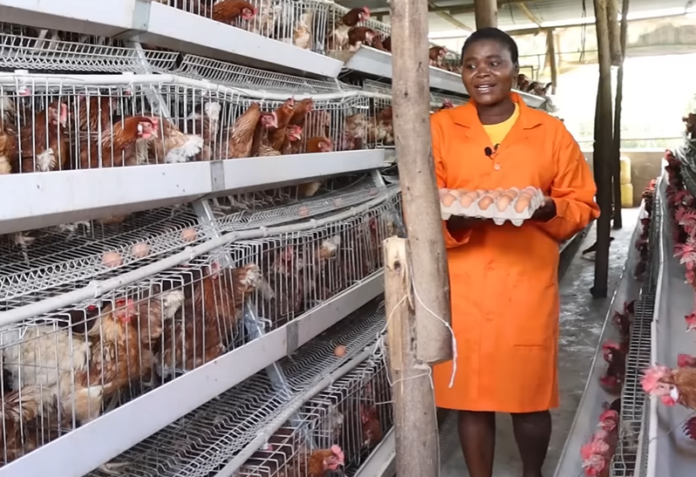Hailing from Makueni County, Anne Ndunda, popularly known as ‘Chicken Queen’, doubles up as both a poultry and fish farmer.
Despite the arid conditions of the Makueni region, Anne jovially states that climate hasn’t been a deterrent factor for her passion in the farming business.
In an interview with Youtube Channel AIM Agriculture, Anne shares her journey, challenges and valuable insights she has gained from her chosen fields.
Rearing Poultry
With a modest starting capital of around 100 chickens, Anne’s business has grown exponentially over the years.
“I got a chicken from my grandmother in 1995, and years later, I started the business with 100 chicks, grew them and sold at a profit,” she recalled.
Anne employs two rearing modes for her chicken: Free Range and Caged Systems.
In the Caged system, she focuses on rearing layers (3,000); while in the Free Range system, she keeps the Kenbro Breed, male and female.
At her farm, Anne Ndunda has employed 4 staff; two casual men and two female employees.
She acknowledges that the farm is often as busy as it gets, but with her amazing staff, none of the chickens succumbs to illnesses. She ensures they are all well-vaccinated against all common illnesses, such as Newcastle Disease.
Her staff also ensure the chicken are well-fed and cared for by regularly cleaning their sleeping area.
“You find that most of the farmers are giving up in poultry because of high mortality rates, but in my farm I don’t get any mortalities because I vaccinate them well.”
Anne also notes that it is very important to give her chicken water. Due to their large numbers, hers consume approximately 5,000 litres of water in just 5 days.
“If you fail to give them water, they’ll not grow well. It’s better you ration their feeds, but ensure you give them water,” Anne explained.
Her Free Range chicken farming method enables her to nurture and raise chicks to maturity. She sells grown chickens at Sh. 8,000 each.
In addition, Anne’s layers yield a daily collection of up to 86 trays of eggs daily. She caters to a readily available market in a nearby town.
“The advantage of caged system is you’ll know the number of birds, accountability, it prevents wastage of feeds, and you will also know birds which are lying and those that aren’t.”
The main challenge she faces in rearing poultry in Ukambani is water. She buys a water bowser at Sh. 3,000 to supply 5,000 litres of water weekly, which is expensive for her. Feeds are also expensive.
In the future, she looks to emulate the President of Kenya, William Ruto, an avid Chicken farmer.
“Come two years, I’d like to emulate what our president is doing…As we speak, he is number one; I’d like to be number two,” she admirably expressed.
Rearing Fish
Being in the aquaculture industry at the heart of a semi-arid region definitely takes guts. Anne’s focus lies in rearing Mud Fish/Cat Fish.
She quickly notes that she chose the latter due to their unique ability to thrive in saline water conditions. Other breeds, like tilapia, only do well in Freshwater, which is inadequate in Ukambani regions.
Her decision to rear Mud Fish was primarily driven by its nutritional value.
With an estimated population of 1,500 fish in her pond, Anne Ndunda joyfully expresses how easy it has been to keep them despite growing numbers.

She says that she has spent between Sh. 60,000 – Sh. 70,000 to take care of them.
“They are not heavy feeders. They don’t need any treatment. Just observe them. Keeping fish is very easy. In fact, I’ve only spent Sh. 60,000,” she said.
Anne slammed the negative stereotypes about fish farming in Ukambani. She boldly asserted that it’s possible to venture into the field in such a climate and achieve remarkable success.
“People usually think that rearing fish in Ukambani is very difficult. That is not true because you just need to have water.”









